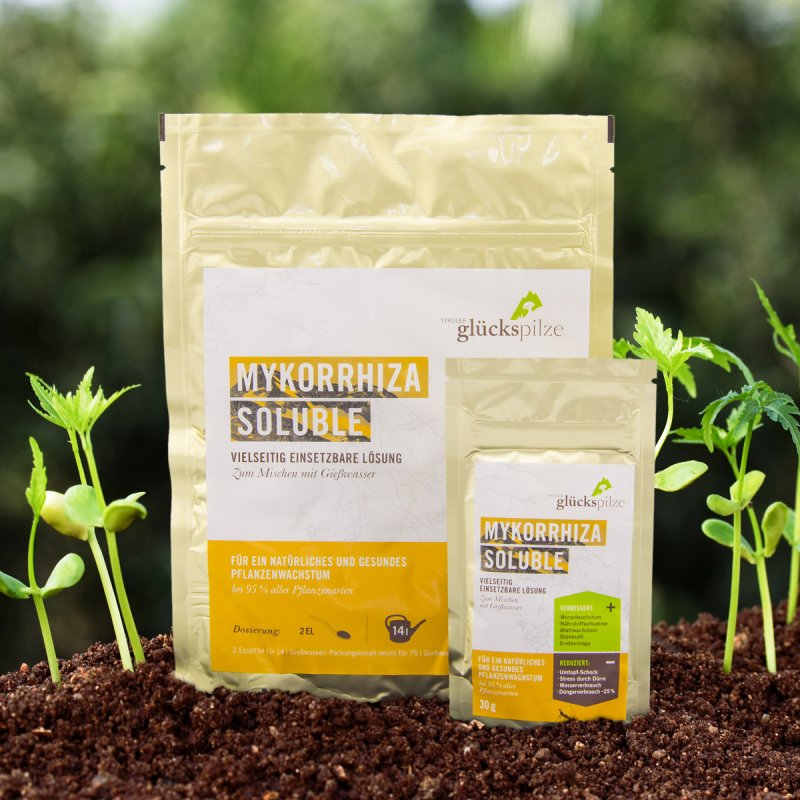Mykorrhiza Pflanzendünger
Für ein natürliches und gesundes Pflanzenwachstum.
Vorteile von Mykorrhiza für Ihre Pflanzen
 |
|
Premium Mykorrhiza aus Österreich:
Wir bieten Mykorrhiza-Produkte für Hobby- und Profianwender in vier unterschiedlichen Arten als Granulat, Pulver für Flüssiglösung (Soluble), Samenimpfstoff und in Tablettenform. Damit sind sämtliche Anwendungsarten abgedeckt.
Düngen Sie jetzt Ihre Pflanzen auf die natürlichste Weise
Jetzt hier kaufen >>
Mykorrhiza Pflanzendünger steigert Ernteerträge
Seit 40 Jahren steht das Zusammenspiel von Mykorrhiza-Pilzen und Pflanzen im Fokus der Wissenschaft. Nun können auch Sie von den positiven Eigenschaften dieser Symbiose profitieren und das Wachstum ihrer Pflanzen auf natürliche Weise fördern.
Der Begriff Mykorrhiza setzt sich aus den Wortteilen Myko (griech. 'Pilz') und Rhiza (griech. 'Pflanzenwurzel') zusammen. In der Natur gehen Mykorrhiza-Pilze und Pflanzenwurzeln eine symbiotische Beziehung zum beiderseitigen Vorteil ein. Fossile Funde belegen, dass sich diese Partnerschaft gleichzeitig mit der Landbesiedelung durch die ersten Urpflanzen vor rund 500 Millionen Jahren entwickelt hat.
Bei 95% aller Nutz- und Zierpflanzen verbessert der Einsatz von Mykorrhiza das Wurzelwachstum, die Nährstoffaufnahme, das Blattwachstum, die Blühkraft und Ernteerträge und gleichzeitig wird der Umsetzungsschock, der Wasser- und Düngerverbrauch sowie Stress durch Dürre verringert.
Wir bieten Mykorrhiza-Produkte für Hobby- und Profianwender in vier unterschiedlichen Arten als Granulat, Pulver für Flüssiglösung (Soluble), Samenimpfstoff und in Tablettenform. Damit sind sämtliche Anwendungsarten abgedeckt.
Die Anwendung ist sehr einfach und kostet nur wenige Cent je Pflanze!
Düngen Sie jetzt Ihre Pflanzen auf die natürlichste Weise
Jetzt hier kaufen >>
Mykorrhiza kann bei 95 % aller Pflanzenarten angewendet werden
Einige der gewerblich wichtigsten Pflanzengruppen, die von Endomykorrhizen profitieren sind: Ahorn, Akazie, Amberbäume, Apfel, Apfelbeere, Aubergine, Artischocke, Avocado, Bambus, Banane, Basilikum, Baumwolle, Buche, Begonie, Birne, Bohnen, Buchsbaum, Chrysantheme, Chili, Dattelpflaumenbaum, Eiben, Erbsen, Erdbeere, Erdnuss, Erle, Esche, Eschenahorn, Eukalyptus, Falsche Akazie, Farn, Feige, Flachs, Forsythie, Fuchsie, Funkien, Gardenien, Geranie, Gerste, Gräser, Guayule, Gummibaum, Gurke, Hanf, Hibiskus, Himbeere, Hirse, Hornstrauch, Johannisbeere, Jojoba, Kaffee, Kakao, Kakteen, Kamelie, Kapuzinerkresse, Karotte, Kartoffel, Kastanie, Kautschuk, Kirsche, Kiwi, Klebsame, Klee, Knoblauch, Kokosnuss, Kopfsalat, Korallenbäume, Kräuter, Kreosotbusch, Kriechwacholder, Kuhbohne, Kürbis, Lauch, Liguster, Litschi, Lorbeer, Löwenmaul, Luzerne, Magnolie, Mahagonibaum, Mahonie, Mais, Mammutbaum, Mandel, Mango, Maniokstrauch, Marille, Maulbeere, mehrjährige Pflanzen, Melden, Mimose, Moskitogras, Myrte, Okra, Olive, Palmen, Pampasgras, Papaya, Pappel, Passionsfrucht, Pazifische Eibe, Pfeffer, Pfirsich, Pflaume, Pistazie, Platane, Prosopis, Prunkwinden, Purgiernuss, Raigras, Reis, Rhus, Ringelblume, Rose, Rotesche, Säckelblume, Salbeistrauch, Sauerbaum, Schalotte, Schmucklilie, Schwingelgras, Sellerie, Sicheltanne, Sojabohne, Sonnenblume, Sorghumhirse, Spargel, Speisekürbis, Spindelsträucher, Springkräuter, Stechpalme, Steineibe, Sternfrucht, Sudangras, Sukkulenten, Süßkartoffel, Tabak, Teepflanze, Tomate, Traubenkirsche, Ulme, Veilchen, Wachsbäume, Weide, Weihnachtsstern, Weintrauben, Weißdorn, Weizen, Yamswurzel, Yucca, Zeder, Zitrusfrüchte, Zitterpappel, Zuckerrohr, Zürgelbaum, Zwiebelgewächse, Zypresse
Ektomykorrhiza: 5% der Pflanzenarten gehen eine Symbiose ein – hauptsächlich Nadelbäume und Eichen (mehr verholzte Pflanzen)
Einige gewerblich wichtigsten Pflanzengruppen, die von Ektomykorrhizen profitieren sind: Bärentraube, Birke, Buche, Douglasfichte, Eiche, Erdbeerbäume, Erle, Espe, Eukalyptus, Fichte, Haselnuss, Hickory, Kastanie, Lärche, Linde, Linde, Pappel, Pekannuss, Pinie, Scheinkastanie, Schierling, Tanne, Thujen, Walnuss, Weide
Düngen Sie jetzt Ihre Pflanzen auf die natürlichste Weise
Jetzt hier kaufen >>


.png)